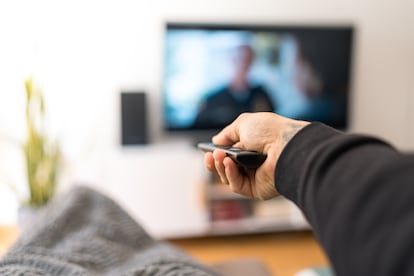The vicious cycle of binge-watching
Non-stop television viewing has been linked to back pain, eye strain, weight gain and other health problems

All the main video-on-demand applications now have algorithms or “curators” that entice viewers by announcing the “perfect series for a marathon” or “the most marathoned series by fans.” Binge-watching has recently motivated a lot of scientific studies, especially as platforms like Netflix, HBO Max, Amazon Prime Video and Disney+ began to expand rapidly worldwide. Subscribers to these platforms can watch an entire series, one episode after another, without waiting a week for a new instalment, a delayed gratification that was commonplace not so long ago.
While many viewers enjoy the instant availability of their favorite shows and movies, compulsive viewing has been linked to health problems like back pain and eye strain. Moreover, a sedentary lifestyle can lead to an increased risk of cardiovascular illness, weight gain and obesity. A 2017 study published in the Journal of Clinical Sleep Medicine for the first time linked binge-watching to a 33% higher likelihood of poor sleep quality and higher levels of fatigue and insomnia.
According to this study, “More than regular viewing, binge-watching leads to greater involvement in the narrative and identification with the characters. This would partly explain why watching a traditional television program regularly at bedtime does not have the same impact on sleep or produce the same arousal.” The structure and narrative complexity of these programs leave viewers thinking about the episodes, “which may delay sleep onset, as it requires a longer cool-down period before going to sleep.”
In October 2022, a study of binge-watching led by researchers from the Sapienza University of Rome and the University of Parma (Italy) was published in the Journal of Sleep Research. Instead of analyzing the frequency or duration of binge-watching, the study examined the underlying motivations for compulsive viewing. “As expected, some people showed a high but healthy binge frequency, as their viewing was motivated by cultural or personal enrichment. However, we observed that coping with loneliness was the prevalent motivation among binge-watchers, suggesting that it could be used as a coping strategy for dysfunctional moods, similar to other addictive behaviors,” says Giorgia Varallo, a clinical psychologist with the University of Parma and co-author of the study.
According to Varallo, there is a bidirectional relationship between sleep and regulating emotions. On the one hand, poor sleep quality is associated with a reduced ability to control emotions and feelings of loneliness. On the other, self-reported or subject-recognized loneliness is related to inferior sleep quality. “These factors suggest that poor sleepers are more likely to binge-watch, creating a vicious cycle with negative consequences as it can further affect sleep quality and induce daytime sleepiness, with an additional effect on emotional state,” she says. The study found that poor sleepers engage in excessive binge-watching and have more dysfunctional motivations than good sleepers. Carallo says study participants with poor sleep quality scored significantly higher on a scale that measures the desire to watch TV series to avoid thinking about real-world problems or cope with unpleasant emotional states.
Nuria Roure, a psychologist specializing in sleep medicine and the author of Por fin duermo (or Sleep, at Last), says these findings about the relationship between sleep and emotion control are consistent with previous studies. Roure says good sleep quality enables the two spheres of the brain – the rational and the emotional – to maintain a close connection and function like a car accelerator and brake. However, poor sleep quality disrupts this connection, and our brakes fail. “When we do not sleep well, we have greater emotional instability,” said Roure. “We have more ups and downs, become more sensitive and less tolerant of our circumstances. We experience an emotional roller coaster. We also have less self-control and become more impulsive. That’s why it’s harder for us to stop watching a TV series when we haven’t slept enough.”
Healthier viewing habits
Varallo says binge-watching can be problematic but can also be benign if done the right way, which is why psychiatrist Xesca Cañellas, a member of the Spanish Sleep Society’s (SES) insomnia working group, noted several limitations of the study. It was conducted during the Covid-19 pandemic confinement and used a non-random sample of mostly young university students who volunteered to participate in the study. Cañellas prefers to avoid “guilting” people and instead recommends “reasonable viewing habits and avoiding binge watching and sleep deprivation. Most importantly, try not to disrupt the body’s circadian sleep-wake rhythm.”
Cañellas says modern lifestyles, especially for city-dwellers, are not very compatible with good sleep habits such as getting up at dawn, spending time outside, being physically active and going to bed shortly after dark. “For starters, most of us get very little direct sunlight. And at night, we are highly exposed to artificial light and perpetually connected to screens, which emit blue light and inhibit the production of melatonin that should start at dusk.”
According to Roure, the blue light’s repressive effect on the body’s melatonin production triggers another vicious circle. “I’m not sleepy, so I’ll stay up and watch a TV series. But the TV series stimulates my brain and exposes me to more blue light, which prevents me from making the melatonin I need to sleep. We watch TV because we’re not sleepy, and we’re not sleepy because we watch TV.”
Even though Roure says the blue light from television screens has a lower impact than cell phones and tablets because they aren’t as close to our faces, she recommends reducing the intensity of the light to mitigate the effects on the brain, especially late in the day. Varallo adds that it’s better not to watch TV in the bedroom because “brain stimulation in bed leads to an association between the bed and a state of wakefulness, which makes it more difficult to fall asleep.” She also advises against watching thrillers, horror and action shows at night. “Content that is excessively engaging and generates a high level of adrenaline triggers pre-sleep awakening, which makes it more difficult to fall asleep afterward.” Fans of these genres shouldn’t go straight to bed after watching, says Roure, who recommends doing things to help the brain relax and disconnect mentally. “If we go to bed while our minds are still very active, we will find it harder to fall asleep. Then we start feeling anxious about not sleeping.”
Sign up for our weekly newsletter to get more English-language news coverage from EL PAÍS USA Edition
Tu suscripción se está usando en otro dispositivo
¿Quieres añadir otro usuario a tu suscripción?
Si continúas leyendo en este dispositivo, no se podrá leer en el otro.
FlechaTu suscripción se está usando en otro dispositivo y solo puedes acceder a EL PAÍS desde un dispositivo a la vez.
Si quieres compartir tu cuenta, cambia tu suscripción a la modalidad Premium, así podrás añadir otro usuario. Cada uno accederá con su propia cuenta de email, lo que os permitirá personalizar vuestra experiencia en EL PAÍS.
¿Tienes una suscripción de empresa? Accede aquí para contratar más cuentas.
En el caso de no saber quién está usando tu cuenta, te recomendamos cambiar tu contraseña aquí.
Si decides continuar compartiendo tu cuenta, este mensaje se mostrará en tu dispositivo y en el de la otra persona que está usando tu cuenta de forma indefinida, afectando a tu experiencia de lectura. Puedes consultar aquí los términos y condiciones de la suscripción digital.









































